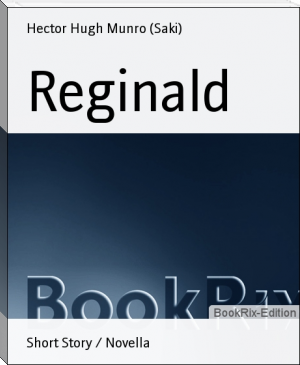Reginald in Russia and other sketches by Hector Hugh Munro (Saki) (most important books to read TXT) 📖

Download in Format:
- Author: Hector Hugh Munro (Saki)
Book online «Reginald in Russia and other sketches by Hector Hugh Munro (Saki) (most important books to read TXT) 📖». Author Hector Hugh Munro (Saki)
When I saw in the glass the haggard and hunted expression which the experiences of the past few weeks had stamped on my erstwhile placid countenance, I could scarcely feel surprised that the few friends and relations I possessed refused to recognise me in my altered guise, and persisted in their obstinate but widely shared belief that it was I who had been done to death on the highway. To make matters worse, infinitely worse, an aunt of the really murdered man, an appalling female of an obviously low order of intelligence, identified me as her nephew, and gave the authorities a lurid account of my depraved youth and of her laudable but unavailing efforts to spank me into a better way. I believe it was even proposed to search me for fingerprints."
"But," said the Chaplain, "surely your educational attainments - "
"That was just the crucial point," said the condemned; "that was where my lack of specialisation told so fatally against me. The dead Salvationist, whose identity I had so lightly and so disastrously adopted, had possessed a veneer of cheap modern education. It should have been easy to demonstrate that my learning was on altogether another plane to his, but in my nervousness I bungled miserably over test after test that was put to me. The little French I had ever known deserted me; I could not render a simple phrase about the gooseberry of the gardener into that language, because I had forgotten the French for gooseberry."
The Chaplain again wriggled uneasily in his seat. "And then," resumed the condemned, "came the final discomfiture. In our village we had a modest little debating club, and I remembered having promised, chiefly, I suppose, to please and impress the doctor's wife, to give a sketchy kind of lecture on the Balkan Crisis. I had relied on being able to get up my facts from one or two standard works, and the back-numbers of certain periodicals. The prosecution had made a careful note of the circumstance that the man whom I claimed to be - and actually was - had posed locally as some sort of second-hand authority on Balkan affairs, and, in the midst of a string of questions on indifferent topics, the examining counsel asked me with a diabolical suddenness if I could tell the Court the whereabouts of Novibazar. I felt the question to be a crucial one; something told me that the answer was St. Petersburg or Baker Street. I hesitated, looked helplessly round at the sea of tensely expectant faces, pulled myself together, and chose Baker Street. And then I knew that everything was lost. The prosecution had no difficulty in demonstrating that an individual, even moderately versed in the affairs of the Near East, could never have so unceremoniously dislocated Novibazar from its accustomed corner of the map. It was an answer which the Salvation Army captain might conceivably have made - and I made it. The circumstantial evidence connecting the Salvationist with the crime was overwhelmingly convincing, and I had inextricably identified myself with the Salvationist. And thus it comes to pass that in ten minutes' time I shall be hanged by the neck until I am dead in expiation of the murder of myself, which murder never took place, and of which, in any case, I am innocent."
* * *
When the Chaplain returned to his quarters some fifteen minutes later, the black flag was floating over the prison tower. Breakfast was waiting for him in the dining-room, but he first passed into his library, and, taking up the Times Atlas, consulted a map of the Balkan Peninsula. "A thing like that," he observed, closing the volume with a snap, "might happen to any one."
THE SEX THAT DOESN'T SHOP
The opening of a large new centre for West End shopping, particularly feminine shopping, suggests the reflection, Do women ever really shop? Of course, it is a well-attested fact that they go forth shopping as assiduously as a bee goes flower-visiting, but do they shop in the practical sense of the word? Granted the money, time, and energy, a resolute course of shopping transactions would naturally result in having one's ordinary domestic needs unfailingly supplied, whereas it is notorious that women servants (and housewives of all classes) make it almost a point of honour not to be supplied with everyday necessities. "We shall be out of starch by Thursday," they say with fatalistic foreboding, and by Thursday they are out of starch. They have predicted almost to a minute the moment when their supply would give out and if Thursday happens to be early closing day their triumph is complete. A shop where starch is stored for retail purposes possibly stands at their very door, but the feminine mind has rejected such an obvious source for replenishing a dwindling stock. "We don't deal there" places it at once beyond the pale of human resort. And it is noteworthy that, just as a sheep-worrying dog seldom molests the flocks in his near neighbourhood, so a woman rarely deals with shops in her immediate vicinity. The more remote the source of supply the more fixed seems to be the resolve to run short of the commodity. The Ark had probably not quitted its last moorings five minutes before some feminine voice gloatingly recorded a shortage of bird-seed. A few days ago two lady acquaintances of mine were confessing to some mental uneasiness because a friend had called just before lunch- time, and they had been unable to ask her to stop and share their meal, as (with a touch of legitimate pride) "there was nothing in the house." I pointed out that they lived in a street that bristled with provision shops and that it would have been easy to mobilise a very passable luncheon in less than five minutes. "That," they said with quiet dignity, "would not have occurred to us," and I felt that I had suggested something bordering on the indecent.
But it is in catering for her literary wants that a woman's shopping capacity breaks down most completely. If you have perchance produced a book which has met with some little measure of success, you are certain to get a letter from some lady whom you scarcely known to bow to, asking you "how it can be got." She knows the name of the book, its author, and who published it, but how to get into actual contact with it is still an unsolved problem to her. You write back pointing out that to have recourse to an ironmonger or a corn-dealer will only entail delay and disappointment, and suggest an application to a bookseller as the most hopeful thing you can think of. In a day or two she writes again: "It is all right; I have borrowed it from your aunt." Here, of course, we have an example of the Beyond-Shopper, one who has learned the Better Way, but the helplessness exists even when such bypaths of relief are closed. A lady who lives in the West End was expressing to me the other day her interest in West Highland terriers, and her desire to know more about the breed, so when, a few days later, I came across an exhaustive article on that subject in the current number of one of our best known outdoor-life weeklies, I mentioned that circumstance in a letter, giving the date of that number. "I cannot get the paper," was her telephoned response. And she couldn't. She lived in a city where newsagents are numbered, I suppose, by the thousand, and she must have passed dozens of such shops in her daily shopping excursions, but as far as she was concerned that article on West Highland terriers might as well have been written in a missal stored away in some Buddhist monastery in Eastern Thibet.
The brutal directness of the masculine shopper arouses a certain combative derision in the feminine onlooker. A cat that spreads one shrew-mouse over the greater part of a long summer afternoon, and then possibly loses him, doubtless feels the same contempt for the terrier who compresses his rat into ten seconds of the strenuous life. I was finishing off a short list of purchases a few afternoons ago when I was discovered by a lady of my acquaintance whom, swerving aside from the lead given us by her godparents thirty years ago, we will call Agatha.
"You're surely not buying blotting-paper HERE?" she exclaimed in an agitated whisper, and she seemed so genuinely concerned that I stayed my hand.
"Let me take you to Winks and Pinks," she said as soon as we were out of the building: "they've got such lovely shades of blotting- paper - pearl and heliotrope and momie and crushed - "
"But I want ordinary white blotting-paper," I said.
"Never mind. They know me at Winks and Pinks," she replied inconsequently. Agatha apparently has an idea that blotting-paper is only sold in small quantities to persons of known reputation, who may be trusted not to put it to dangerous or improper uses. After walking some two hundred yards she began to feel that her tea was of more immediate importance than my blotting-paper.
"What do you want blotting-paper for?" she asked suddenly. I explained patiently.
"I use it to dry up the ink of wet manuscript without smudging the writing. Probably a Chinese invention of the second century before Christ, but I'm not sure. The only other use for it that I can think of is to roll it into a ball for a kitten to play with."
"But you haven't got a kitten," said Agatha, with a feminine desire for stating the entire truth on most occasions.
"A stray one might come in at any moment," I replied.
Anyway, I didn't get the blotting-paper.
THE BLOOD-FEUD OF TOAD-WATER A WEST-COUNTRY EPIC
The Cricks lived at Toad-Water; and in the same lonely upland spot Fate had pitched the home of the Saunderses, and for miles around these two dwellings there was never a neighbour or a chimney or even a burying-ground to bring a sense of cheerful communion or social intercourse. Nothing but fields and spinneys and barns, lanes and waste-lands. Such was Toad-Water; and, even so, Toad-Water had its history.
Thrust away in the benighted hinterland of a scattered market district, it might have been supposed that these two detached items of the Great Human Family would have leaned towards one another in a fellowship begotten of kindred circumstances and a common isolation from the outer world. And perhaps it had been so once, but the way of things had brought it otherwise. Indeed, otherwise. Fate, which had linked the two families in such unavoidable association of habitat, had ordained that the Crick household should nourish and maintain among its earthly possessions sundry head of domestic fowls, while to the Saunderses was given a disposition towards the cultivation of garden crops. Herein lay the material, ready to hand, for the coming of feud and ill-blood. For the grudge between the man of herbs and the man of live stock is no new thing; you will find traces of it in the fourth chapter of Genesis. And one sunny afternoon in late spring-time the feud came - came, as such things mostly do come, with seeming aimlessness and triviality. One of the Crick hens, in obedience to the nomadic instincts of her kind, wearied of her legitimate scatching-ground,
"But," said the Chaplain, "surely your educational attainments - "
"That was just the crucial point," said the condemned; "that was where my lack of specialisation told so fatally against me. The dead Salvationist, whose identity I had so lightly and so disastrously adopted, had possessed a veneer of cheap modern education. It should have been easy to demonstrate that my learning was on altogether another plane to his, but in my nervousness I bungled miserably over test after test that was put to me. The little French I had ever known deserted me; I could not render a simple phrase about the gooseberry of the gardener into that language, because I had forgotten the French for gooseberry."
The Chaplain again wriggled uneasily in his seat. "And then," resumed the condemned, "came the final discomfiture. In our village we had a modest little debating club, and I remembered having promised, chiefly, I suppose, to please and impress the doctor's wife, to give a sketchy kind of lecture on the Balkan Crisis. I had relied on being able to get up my facts from one or two standard works, and the back-numbers of certain periodicals. The prosecution had made a careful note of the circumstance that the man whom I claimed to be - and actually was - had posed locally as some sort of second-hand authority on Balkan affairs, and, in the midst of a string of questions on indifferent topics, the examining counsel asked me with a diabolical suddenness if I could tell the Court the whereabouts of Novibazar. I felt the question to be a crucial one; something told me that the answer was St. Petersburg or Baker Street. I hesitated, looked helplessly round at the sea of tensely expectant faces, pulled myself together, and chose Baker Street. And then I knew that everything was lost. The prosecution had no difficulty in demonstrating that an individual, even moderately versed in the affairs of the Near East, could never have so unceremoniously dislocated Novibazar from its accustomed corner of the map. It was an answer which the Salvation Army captain might conceivably have made - and I made it. The circumstantial evidence connecting the Salvationist with the crime was overwhelmingly convincing, and I had inextricably identified myself with the Salvationist. And thus it comes to pass that in ten minutes' time I shall be hanged by the neck until I am dead in expiation of the murder of myself, which murder never took place, and of which, in any case, I am innocent."
* * *
When the Chaplain returned to his quarters some fifteen minutes later, the black flag was floating over the prison tower. Breakfast was waiting for him in the dining-room, but he first passed into his library, and, taking up the Times Atlas, consulted a map of the Balkan Peninsula. "A thing like that," he observed, closing the volume with a snap, "might happen to any one."
THE SEX THAT DOESN'T SHOP
The opening of a large new centre for West End shopping, particularly feminine shopping, suggests the reflection, Do women ever really shop? Of course, it is a well-attested fact that they go forth shopping as assiduously as a bee goes flower-visiting, but do they shop in the practical sense of the word? Granted the money, time, and energy, a resolute course of shopping transactions would naturally result in having one's ordinary domestic needs unfailingly supplied, whereas it is notorious that women servants (and housewives of all classes) make it almost a point of honour not to be supplied with everyday necessities. "We shall be out of starch by Thursday," they say with fatalistic foreboding, and by Thursday they are out of starch. They have predicted almost to a minute the moment when their supply would give out and if Thursday happens to be early closing day their triumph is complete. A shop where starch is stored for retail purposes possibly stands at their very door, but the feminine mind has rejected such an obvious source for replenishing a dwindling stock. "We don't deal there" places it at once beyond the pale of human resort. And it is noteworthy that, just as a sheep-worrying dog seldom molests the flocks in his near neighbourhood, so a woman rarely deals with shops in her immediate vicinity. The more remote the source of supply the more fixed seems to be the resolve to run short of the commodity. The Ark had probably not quitted its last moorings five minutes before some feminine voice gloatingly recorded a shortage of bird-seed. A few days ago two lady acquaintances of mine were confessing to some mental uneasiness because a friend had called just before lunch- time, and they had been unable to ask her to stop and share their meal, as (with a touch of legitimate pride) "there was nothing in the house." I pointed out that they lived in a street that bristled with provision shops and that it would have been easy to mobilise a very passable luncheon in less than five minutes. "That," they said with quiet dignity, "would not have occurred to us," and I felt that I had suggested something bordering on the indecent.
But it is in catering for her literary wants that a woman's shopping capacity breaks down most completely. If you have perchance produced a book which has met with some little measure of success, you are certain to get a letter from some lady whom you scarcely known to bow to, asking you "how it can be got." She knows the name of the book, its author, and who published it, but how to get into actual contact with it is still an unsolved problem to her. You write back pointing out that to have recourse to an ironmonger or a corn-dealer will only entail delay and disappointment, and suggest an application to a bookseller as the most hopeful thing you can think of. In a day or two she writes again: "It is all right; I have borrowed it from your aunt." Here, of course, we have an example of the Beyond-Shopper, one who has learned the Better Way, but the helplessness exists even when such bypaths of relief are closed. A lady who lives in the West End was expressing to me the other day her interest in West Highland terriers, and her desire to know more about the breed, so when, a few days later, I came across an exhaustive article on that subject in the current number of one of our best known outdoor-life weeklies, I mentioned that circumstance in a letter, giving the date of that number. "I cannot get the paper," was her telephoned response. And she couldn't. She lived in a city where newsagents are numbered, I suppose, by the thousand, and she must have passed dozens of such shops in her daily shopping excursions, but as far as she was concerned that article on West Highland terriers might as well have been written in a missal stored away in some Buddhist monastery in Eastern Thibet.
The brutal directness of the masculine shopper arouses a certain combative derision in the feminine onlooker. A cat that spreads one shrew-mouse over the greater part of a long summer afternoon, and then possibly loses him, doubtless feels the same contempt for the terrier who compresses his rat into ten seconds of the strenuous life. I was finishing off a short list of purchases a few afternoons ago when I was discovered by a lady of my acquaintance whom, swerving aside from the lead given us by her godparents thirty years ago, we will call Agatha.
"You're surely not buying blotting-paper HERE?" she exclaimed in an agitated whisper, and she seemed so genuinely concerned that I stayed my hand.
"Let me take you to Winks and Pinks," she said as soon as we were out of the building: "they've got such lovely shades of blotting- paper - pearl and heliotrope and momie and crushed - "
"But I want ordinary white blotting-paper," I said.
"Never mind. They know me at Winks and Pinks," she replied inconsequently. Agatha apparently has an idea that blotting-paper is only sold in small quantities to persons of known reputation, who may be trusted not to put it to dangerous or improper uses. After walking some two hundred yards she began to feel that her tea was of more immediate importance than my blotting-paper.
"What do you want blotting-paper for?" she asked suddenly. I explained patiently.
"I use it to dry up the ink of wet manuscript without smudging the writing. Probably a Chinese invention of the second century before Christ, but I'm not sure. The only other use for it that I can think of is to roll it into a ball for a kitten to play with."
"But you haven't got a kitten," said Agatha, with a feminine desire for stating the entire truth on most occasions.
"A stray one might come in at any moment," I replied.
Anyway, I didn't get the blotting-paper.
THE BLOOD-FEUD OF TOAD-WATER A WEST-COUNTRY EPIC
The Cricks lived at Toad-Water; and in the same lonely upland spot Fate had pitched the home of the Saunderses, and for miles around these two dwellings there was never a neighbour or a chimney or even a burying-ground to bring a sense of cheerful communion or social intercourse. Nothing but fields and spinneys and barns, lanes and waste-lands. Such was Toad-Water; and, even so, Toad-Water had its history.
Thrust away in the benighted hinterland of a scattered market district, it might have been supposed that these two detached items of the Great Human Family would have leaned towards one another in a fellowship begotten of kindred circumstances and a common isolation from the outer world. And perhaps it had been so once, but the way of things had brought it otherwise. Indeed, otherwise. Fate, which had linked the two families in such unavoidable association of habitat, had ordained that the Crick household should nourish and maintain among its earthly possessions sundry head of domestic fowls, while to the Saunderses was given a disposition towards the cultivation of garden crops. Herein lay the material, ready to hand, for the coming of feud and ill-blood. For the grudge between the man of herbs and the man of live stock is no new thing; you will find traces of it in the fourth chapter of Genesis. And one sunny afternoon in late spring-time the feud came - came, as such things mostly do come, with seeming aimlessness and triviality. One of the Crick hens, in obedience to the nomadic instincts of her kind, wearied of her legitimate scatching-ground,
Free ebook «Reginald in Russia and other sketches by Hector Hugh Munro (Saki) (most important books to read TXT) 📖» - read online now
Similar e-books:





Comments (0)